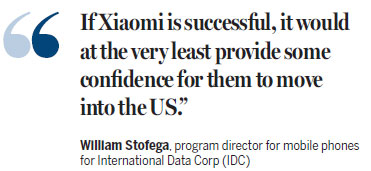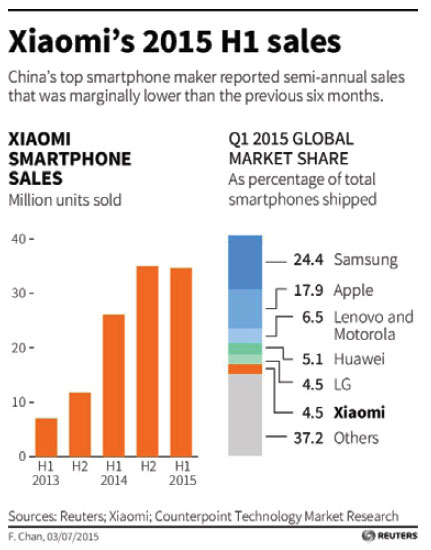Xiaomi's venture into Brazilian market could set stage for US foray
Updated: 2015-07-06 10:56
By Paul Welitzkin in New York(China Daily USA)
|
||||||||
Xiaomi's selection of Brazil as the first market outside of Asia for its smartphone represents an opportunity to establish a foothold in Latin America and may also serve as a stepping stone to enter the US, according to analysts.
Last week Xiaomi, the world's third-largest smartphone maker, announced it would begin selling the Redmi 2 in Brazil on June 30 for about 499 Reals ($160). The Redmi 2 is the latest version of its Android budget phone.
"Brazil is obviously a different market than China and it can serve as a model for other Latin American countries," William Stofega, program director for mobile phones for International Data Corp (IDC), said in an interview. "The pricing is ideal for Xiaomi. If you go higher, then the number of people who can afford the phone declines."
"Brazil was an obvious choice as it is the largest market in Latin America, with a population of around 200 million, or around a third of the population of Latin America. A number of other handset vendors from other markets have prioritized Brazil as an important part of their strategy for the region, and it's a great jumping-off point for the other countries (in the region)," Jan Dawson, chief analyst at Jackdaw Research in Highland, Utah, wrote in an email.
"Brazil also has a substantial aspiring middle class, the kind of customers Xiaomi targets -those who can afford more than the cheapest devices but can't perhaps quite afford the really high-end phones like iPhones and Samsung Galaxy S phones."
Stofega believes that the Brazil launch will not only help establish Xiaomi in Latin America, but could also help the company eventually move farther north and enter the US market."This will be a litmus test to see how well they do in an Americas market. If Xiaomi is successful, it would at the very least provide some confidence for them to move into the US," he said.
However, Dawson doesn't believe that any Brazil success would necessarily translate into the US market.
"The US is really a unique market, and I don't see Brazil as in any way an entry point to that market. Xiaomi's challenges in the US are pretty substantial when it comes to selling phones, and being in Brazil really doesn't help with any of those," said Dawson.
Among those challenges is Xiaomi's selling strategy. The company sells Android-based phones directly to consumers rather than through an agent or carrier, usually charging about half what competitors charge.
Stofega said Brazil is a mixed market where consumers buy phones from telecom stores and order the devices online. "The people there are very comfortable with going to a store and this is the area where most of the attention will be focused," he said. "Who is going to help the consumer if there is a problem? I'm sure (Hugo) Barra (Xiaomi's global vice-president) will make sure the company has an adequate support system in place."
Beijing-based Xiaomi selected Taiwan-based Foxconn to assemble the phones in part to avoid a Brazilian tax on electronics imports.


|
Hugo Barra, vice-president of international operations for Chinese smartphone maker Xiaomi, poses for a photograph during a news conference in Sao Paulo on June 30. Paulo Whitaker / Reuters |
(China Daily USA 07/06/2015 page2)
- Injured ROK tourists in intensive care
- 36 dead, 26 missing after banca capsized in C. Philippines
- Thai navy plans to buy three Chinese subs
- Mass casualties in Indonesian military plane crash
- Japan's LDP lawmaker denounces Abe's security policies
- More than 100 feared dead in Indonesian military plane crash

 Veterans mark the beginning of the War of Resistance against Japanese Aggression
Veterans mark the beginning of the War of Resistance against Japanese Aggression
 US beat Japan 5-2 to win Women's World Cup
US beat Japan 5-2 to win Women's World Cup
 Top 10 most expensive cities in the world
Top 10 most expensive cities in the world
 Italian designer tailors success in China
Italian designer tailors success in China
 People take part in Independence Day parade in Washington
People take part in Independence Day parade in Washington
 Unusual heat wave sweeps across Europe
Unusual heat wave sweeps across Europe
 Class of 2015 celebrates in Beijing
Class of 2015 celebrates in Beijing
 Heavy rainfall causes landslide in NW China
Heavy rainfall causes landslide in NW China
Most Viewed
Editor's Picks

|

|

|

|

|

|
Today's Top News
US urged to 'correctly perceive China's strategic intentions'
China brokers pledge 120b yuan to stabilize stock market
For PetroChina, move to Houston pays off
China-France ties 'benefit all'
Concern over US military strategy
Will Alibaba, Amazon clash?
China-France ties 'benefit all'
Veteran diplomat in Havana shortlisted for ambassador
US Weekly

|

|








